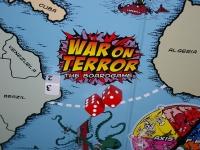PRESIDENT BUSH: Our War on Terror begins with al Qaeda but it does not end there.
BOB GARFIELD: That’s President Bush in September of 2001 in an address to Congress, unveiling a phrase that would be used in countless speeches and news reports in the years that followed. This week, The Washington Post reported that both the Pentagon and the new president have shunned the “War on Terror” terminology, referring instead to something called the “Overseas Contingency Operation.” The administration has since responded to The Post’s piece, insisting that there has been no official decision about the phrase. But some reporters have noted that they don't expect to hear the Obama White House using “Global War on Terror” anytime soon. We don't know if “Overseas Contingency Operation” will take root in the press and the public debate, but we thought we'd examine perhaps the defining piece of Bush Administration rhetoric with Kathleen Hall Jamieson, director of the Annenberg Public Policy Center at the University of Pennsylvania. Kathleen, welcome back to the show.
KATHLEEN HALL JAMIESON: [LAUGHS] It’s good to be on.
BOB GARFIELD: You know, as Bush-era rhetoric goes – Patriot Act, Homeland Security, smoke 'em out – War on Terror seemed pretty much to nail it. What was the argument against that term?
KATHLEEN HALL JAMIESON: You can't really have a war on a tactic. You have to be able to identify what the enemy is, and you’re never going to defeat something called “terror.” You might defeat terrorists in a specific place, but you’re not [LAUGHS] going to defeat a tactic.
BOB GARFIELD: It strikes me that the granddaddy of these wars against things that don't actually carry guns was the War on Poverty, Lyndon Johnson, 1964, and the idea that urban and rural poverty could be eradicated in our lifetimes.
[CLIP/MUSIC UP AND UNDER]:
MAN: President Johnson’s War on Poverty has this one goal – to provide everyone a chance to grow and make his own way, a chance at education, a chance at training – a chance at a fruitful life.
[END CLIP]
BOB GARFIELD: Now, one thing about the War on Poverty, President Johnson did set a list of expected outcomes. He said what was at stake and what specific accomplishments he was looking for, something that we haven't seen in more recent wars against a conceptual enemy.
KATHLEEN HALL JAMIESON: When you’re using “war” as a metaphor, specifying the objectives is a very smart move. Lyndon Johnson didn't actually say he was going to defeat poverty now and forever, but as we move away from his list of specific objectives, we lose track of that. One might argue that the byproduct of the War on Poverty were specific food programs, certain nutrition programs. Certain housing programs came into place. The metaphor became a focusing device to invite people to see a problem that to that point hadn't been on the national agenda in the same way. And that focusing is part of what a metaphor of war does.
BOB GARFIELD: One thing you've got to say about metaphors is they're very convenient. They're easy to understand. At one point, I've read that, when informed that War on Terror just wasn't doing the job because it was imprecise, the President flipped out and said, no, everybody in America understands what the war on terror is.
KATHLEEN HALL JAMIESON: One of the questions that was asked after September 11th was were we going to use a language of law enforcement where the implication would be that we're going to find them and bring them to justice, but justice in a court system, or were we going to use a language of war? The Bush Administration deliberately rejected the language that said this is illegal activity and would be punished in a court system, which is actually what we'd done after the initial bombing of the World Trade Center. We lost track very early in the discussion of the war on terror of the fact that there was an alternative language. And so the question, when you ask what’s the alternative metaphor, is what are the alternative means of acting to protect the country against this threat? And having answered that, you then find the metaphor that’s appropriate to describe those actions.
BOB GARFIELD: In about the middle of the administration, Former Defense Secretary Donald Rumsfeld and the President tried floating alternative terms.
KATHLEEN HALL JAMIESON: Mm-hmm.
BOB GARFIELD: They said “War Against Violent Extremists,” for example, but it never stuck, and the President himself reverted back to where he'd started. How attached are we, the public, to this kind of phraseology? Do you think we're prepared to let it go?
KATHLEEN HALL JAMIESON: “War on Terror” has become a naturalized, assumed way to describe something and people don't ask, what’s the something – what are the implications of using this and not some other vocabulary – which is why it’s more likely that it’s going to be retired than that it’s going to be replaced by a strange phrase that has the word “contingency” in it. I think the pullback rhetorically is a very smart move to help the administration disengage. By not adopting the global mantle of “War on Terror” one can focus on the question, what are the benchmarks that we need to reach to move out of Afghanistan, to move out of Iraq?
BOB GARFIELD: Kathleen, as always, thanks so much.
KATHLEEN HALL JAMIESON: You’re welcome.
BOB GARFIELD: Kathleen Hall Jamieson is professor of communications and director of the Annenberg Public Policy Center at the University of Pennsylvania. She is coauthor of Presidents Creating the Presidency: Deeds Done in Words.
BROOKE GLADSTONE: This is On the Media from NPR.

